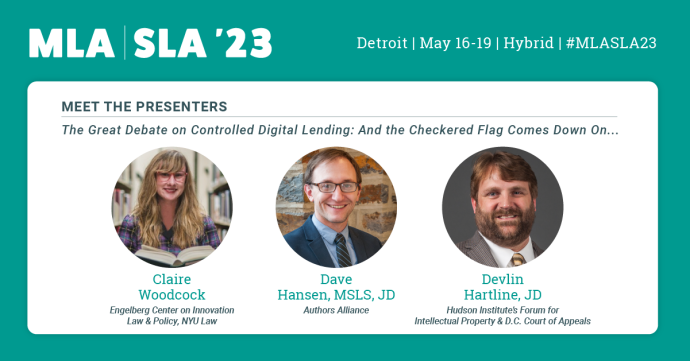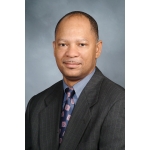Every week until MLA | SLA '23 in Detroit, we'll profile the experts leading each of the six Collection Development & Resource Sharing Symposium sessions by sharing their answers to questions about themselves and their session.
We continue the series with the presenters and moderator of The Great Debate on Controlled Digital Lending: And the Checkered Flag Comes Down On... : Claire Woodcock (CW), Dave Hansen (Da H), and Devlin Hartline (De H). Join them for their session on May 17, 10:30 a.m. - noon, local time in Detroit and streamed live to Virtual attendees.
If you have Controlled Digital Lending questions you’d like to see debated, please see Your Controlled Digital Lending (CDL) Questions Could Be Debated at MLA | SLA '23!.
To learn about all the Symposium sessions and their presenters, please see the Symposium Session Schedule.
What are you most looking forward to seeing/eating/experiencing in Detroit?
CW: I have a good friend from my days as an unpaid intern in D.C. who lives in Detroit and loves it! It will be my first time visiting. I'm looking forward to checking out the downtown area, taking in the architecture, and finding out for myself how the pizza compares to NY style (what I'm used to, being from NY and all).
Da H: I love Detroit-style pizza, which I’ve found is sadly overshadowed (or worse, confused with) Chicago style. I’m looking forward to getting some from Luigis.
De H: This will be my first trip to Detroit, though I’ve been to Michigan many times. Growing up, we would spend the summer at Big Platte Lake in Benzie County. We’d always have lots of Michigan cherries and Vernor’s ginger ale. Cherries won’t quite be in season yet, but I’m looking forward to some ice cold Vernor’s.
What’s a fun or surprising fact about Controlled Digital Lending (CDL)?
CW: I think there are more libraries following the CDL legal framework than people realize.
Da H: Internet Archive’s Open Library is obviously the highest profile CDL application, but there are actually hundreds of libraries (just that I know of) doing a version of CDL, from small school media centers to massive research libraries, with widely varying collection and technological profiles. CDL has lots of different uses.
De H: The central theory of CDL is that the first sale doctrine should apply to digital copies transmitted over the internet. But the “digital first sale” theory is nothing new. It’s been studied—and rejected—for over two decades by Congress and the Copyright Office. Presumably, the proponents of CDL are now pursuing the theory in the courts because they’ve been unable to make any progress with legislative changes.
How did you get interested in CDL?
CW: Surprisingly, not from the Internet Archive case! I wrote external communications on CDL when I worked in the marketing department of an academic library.
Da H: Most books and other published materials from the 20th century are still unavailable online. About ten years ago, I was doing work related to the Google Books lawsuit. That really sparked my interest in thinking about what other strategies could be employed to find a way to bring more books online. I think CDL is among the best options available.
De H: I’ve always wondered how the Internet Archive doesn’t get sued all the time, since it obviously plays fast and loose with the Copyright Act. When the publishers brought suit at the start of the pandemic, I looked into the CDL theory more closely. I quickly determined that it’s just wrong as a matter of copyright law, and it struck me as disappointing that its supporters are so dismissive of authorial rights.
What’s the most rewarding part of working in or addressing the areas of copyright and intellectual property?
CW: I report on book bans in school and public libraries. These censorship efforts are necessary to document in real time for the public record. But I find copyright and intellectual property much more intellectually stimulating. There's the saying--If you're banning books, you're on the wrong side of history. With copyright and intellectual property, it's far more complicated and nuanced. I enjoy trying to articulate the tensions between access and spread with a broad audience.
Da H: Copyright and related law is a complex system that plays a huge role in how we as a society communicate with each other. I find it rewarding to peel back the layers and help authors, publishers, and librarians understand the rationale and goals behind the system and how it serves (or fails to serve) their interests.
De H: I know a lot of people think that copyright law is just some antiquated thing that gets in the way of our modern digital world. But very few people seem to recognize the key role that effective copyright protection plays in supporting the creative ecosystem that benefits us all. I love working in copyright law and policy because I firmly believe that safeguarding the rights of authors is critical to a flourishing society.
What’s the main thing you hope participants will take away from your contribution to the session?
CW: Dave and Devlin are both passionate about their interpretations of CDL. I challenge the audience to think about the facts they present in their arguments and how they relate to their library and how their users' experiences can inform the greater conversation we're having here.
Da H: Aside from convincing you that controlled digital lending is a good and legal thing, I hope attendees will come away with a better understanding of the goal of copyright law (to promote the progress of science and the useful arts), the ways that the law incorporates the important mission of libraries in achieving that goal, and how the mission of libraries intersects with supporting and catalyzing the work of creators such as authors.
De H: I might be one of the only non-librarians in the room, but I understand the fundamental role that libraries play in our society and sympathize with the significant challenges they are facing. I hope that attendees will recognize that CDL is not a solution to these struggles. It’s nothing like the transformative uses that have been held to be fair, and it usurps the market for e-book licensing that puts real money in the pockets of authors.




